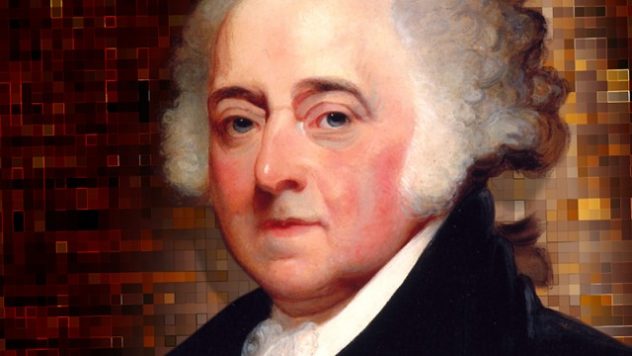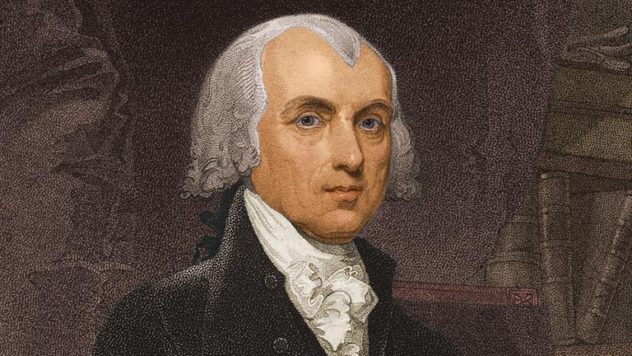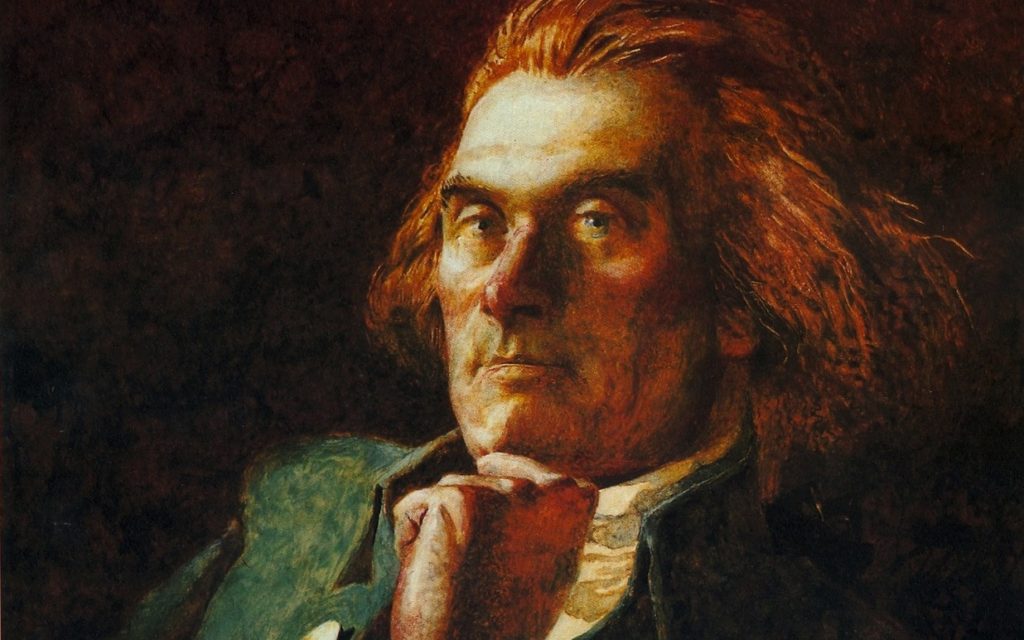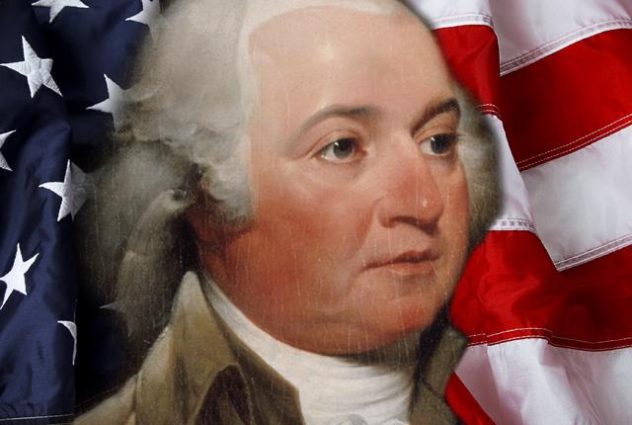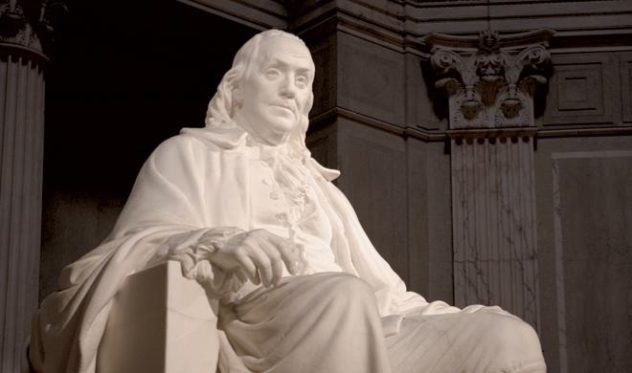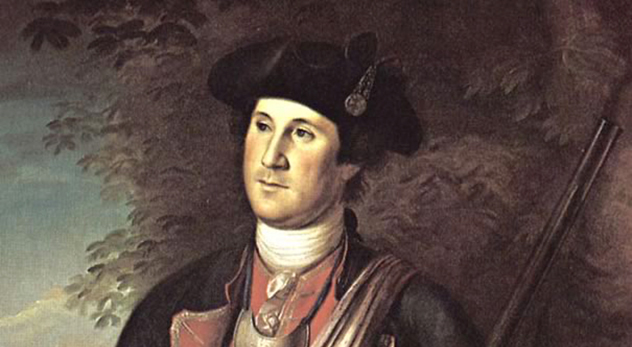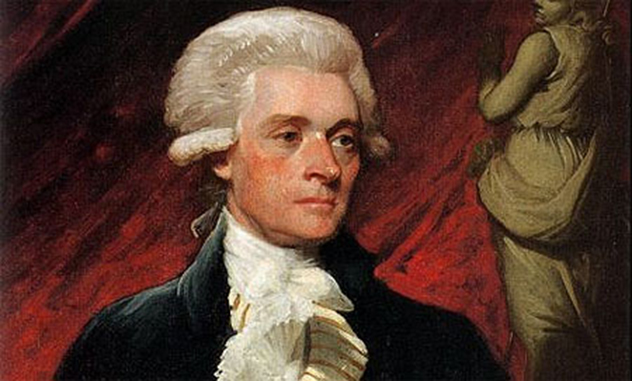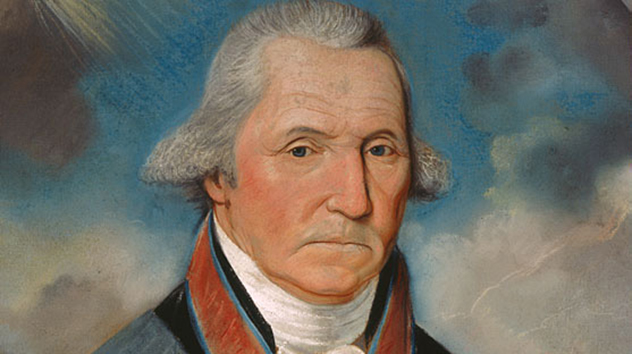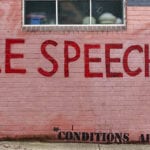Unfortunately, a lot of the wisdom attributed to these seven is bogus. Some of it may have been said, but it was said be a different person. Some quotes are garbled versions of what they said that distort their meaning, and some are total fabrications by people who want to win an argument and think creating a fake quote is a good tactic to use It is difficult to rank order bogus quotes, so this list does not attempt to do so, though #1 is definitely the most egregious.
10John Adams And The Holy Ghost
“There is no authority, civil or religious—there can be no legitimate government—but what is administered by this Holy Ghost. There can be no salvation without it—all without it is rebellion and perdition, or, in more orthodox words, damnation.”—John Adams There are a number of spurious quotes used to buttress the idea that the Founders were all devout Christians who founded the United States on biblical principles. This quote—which was featured on Glen Beck’s series “Founders Fridays”—is one. Unlike many other quotes on this list, this meme actually contains the words of John Adams, but edited to change its meaning. The quote comes from an 1809 letter to his friend, Benjamin Rush. Reading the whole thing shows that Adams was making fun of the idea that the Holy Ghost gave divine authority to bishops, kings, and heads of state. Adams was a believer but, as a Unitarian he didn’t believe in the Holy Ghost. He was also deeply skeptical of the clergy’s claims of special knowledge and rejected the idea of a divine appointment of kings. For the record, the founders were not united in any view of religion. George Washington, John Jay, and Alexander Hamilton were Episcopalians (with varying degrees of piety), John Adams was Unitarian, Ben Franklin and Thomas Jefferson were deists (those who believe in God without recourse to supernatural revelation), and there is some question whether James Madison was Episcopalian or deist. Despite their differing views, they held in common the idea that religion should not be commingled with government.
9James Madison On The Commandments
“We have staked the whole future of American civilization, not upon the power of government, far from it. We have staked the future of all of our political institutions upon the capacity of mankind for self-government: upon the capacity of each and all of us to govern ourselves, to control ourselves, to sustain ourselves according to the Ten Commandments of God.”—James Madison This statement once was widely quoted at one point by religious conservatives, including David Barton and the late Jerry Falwell. It is used much less since Madison scholars reported that it is not found anywhere in his writings It looks a little like something Madison did say. In Federalist Papers XXXIX he refers to “ . . . that honourable determination which animates every votary of freedom, to rest all our political experiments on the capacity of mankind for self government.” But this has been altered and the reference to the 10 Commandments added.
8George Washington On The Bible
“It is impossible to rightly govern a nation without God and the Bible.”—George Washington Sometimes claimed as part of Washington’s farewell address of 1796, this appears to have been invented for a biography of him first published in 1835, but it does not appear in any of his papers. The Mount Vernon archive contains several other false quotes about Washington’s thoughts on Christianity in American life, including: “What students would learn in American schools above all is the religion of Jesus Christ.” Washington was a professing Episcopalian. It’s impossible to judge the depth of his faith, but it is known that he made few public professions of it. He also believed in the full equality of Americans regardless of religion, and there is no record of him ever expressing the thought that Christianity should be the official religion of the US.
7Thomas Jefferson On Hypocrisy
“The Christian god can easily be pictured as virtually the same god as the many ancient gods of past civilizations. The Christian god is a three headed monster; cruel, vengeful and capricious. If one wishes to know more of this raging, three headed beast-like god, one only needs to look at the caliber of people who say they serve him. They are always of two classes: fools and hypocrites.”—Thomas Jefferson While some bogus quotes try to make all of the Founders devout Christians, others work just as hard at making them anti-religionists. This is one of several memes that suggest Jefferson viewed belief in God in contempt. Thomas Jefferson may have been the most skeptical of the founders about religion. He created the “Jefferson Bible” by removing all passages involving miracles or divine intervention and all passages characterizing God as harsh or judgmental. What was left was mostly the ethical teachings of Jesus, for which Jefferson had deep regard. While this passage contains some of Jefferson’s words, they are strung together out of context. Jefferson was critical of the tenets of Christianity and had no interest in organized religion, but his views on God and Jesus were complex, and not entirely negative. At this distance, we can’t exactly what he believed but we can tell that he didn’t make this statement.
6John Adams on God’s Essence
“God is an essence we know nothing of. Until this awful blasphemy is gotten rid of there will never be any liberal science in the world.”—John Adams This quote is actually two sentences from different letters, written five years apart. The way they’re joined in the meme makes it seem as if Adams is saying belief in God must go in order for science to make progress. Actually, Adams believed in God, but thought that the nature of God—aside from goodness, power, wisdom, and other virtues—was unknown and unknowable. In other words, he seemed to regard belief in God as a good thing, so long as the believer did not make unwarranted assumptions about God. This is the gist of the letter that the first sentence was taken from. The second sentence, which talks about the “awful blasphemy” is referring to the doctrine of the incarnation. Adams admired Jesus as an ethical teacher, but thought the idea that he was God in human form was nonsense. Like Jefferson, he was neither an Orthodox Christian nor an outright atheist, but an original thinker with a unique take on religious ideas.
5Ben Franklin on Liberty
“Democracy is two wolves and a lamb voting on what to have for lunch. Liberty is a well-armed lamb contesting the vote.”—Ben Franklin One of the most unusual trends in bogus memes is using the engineers of American democracy to denounce democracy. The first part of the quote sounds a little like the sort of aphorism Franklin was fond of writing. The second part, about the well-armed lamb, does not reflect his ideas at all. In fact, neither comes from Franklin, and the word “lunch” was not even in use until decades after his death. The search engine at the Franklin Papers Online—an excellent tool for checking Franklin quotes—verifies that Franklin didn’t say this. Dr. Franklin was an active proponent of democracy, as were the rest of the Founders, including Thomas Jefferson. Despite that, there’s a similar meme that goes around with Jefferson’s name attached to it. “A democracy is nothing more than mob rule, where 51 percent of the people may take away the rights of the other 49.”—Thomas Jefferson. Like the Franklin meme, this appears to be in modern saying falsely attributed to a founding father. It does not appear in any of Jefferson’s letters or papers.
4Thomas Jefferson On Criminals And Government
“The two enemies of the people are criminals and government, so let us tie the second down with the chains of the Constitution so the second will not become the legalized version of the first.”—Thomas Jefferson There was more than one vision of the federal government among the founders. Alexander Hamilton was in favor of a stronger central government and Thomas Jefferson believed that a weaker central government and more power in the states was the better course. That makes Jefferson a natural hero for modern small-government conservatives. However, these words—and many other anti-government memes with Jefferson’s name on them—are more extreme than Jefferson’s views and they do not appear in any of his writings. While Jefferson did use the term “the chains of the constitution” in a different context, the rest of the quote appears to come from Ayn Rand’s in her essay, “Man’s Rights.” Several other small-government quotes which are often misattributed to Jefferson are: “When governments fear the people, there is liberty. When the people fear the government, there is tyranny.” “The best government is that which governs least.” While these, to some degree, reflect Jefferson’s ideas about government, according to the Jefferson Archive, he never said either.
3George Washington On Guns
“When government takes away citizens’ right to bear arms it becomes citizens’ duty to take away government’s right to govern.”—George Washington One of the frequent claims of modern gun rights supporters is that the purpose of the second amendment was to insure that individual citizens remain armed to protect themselves from the government in case it should overstep itself. This meme tells us that no less than the first president felt this way. In this case, the meme is not only something George Washington never said, but he is known for taking the opposite side of this argument in a very forceful way. In 1794 citizens in western Pennsylvania rose up in an armed insurrection to protest the federal government imposing taxes on the whiskey they produced. If the meme were true, you’d expect Washington to have joined the armed anti-tax rebels and their movement—known as the Whiskey Rebellion—but he didn’t. In fact, he was so concerned that the rebellion could diminish the authority of the federal government that he came out of retirement and led the militia against them. Seeing a force of 16,000 led by the hero of the Revolution, the protestors surrendered without a fight. A similar Washington meme credits him with saying the following: “Firearms stand next in importance to the Constitution itself. They are the American people’s Liberty teeth and keystone under Independence. The church, the plow, the prairie wagon, and citizens’ firearms are indelibly related. From the hour the Pilgrims landed, to the present day, events, occurrences and tendencies prove that to insure peace, security and happiness, the rifle and pistol are equally indispensable. Every corner of this Land knows firearms and more than 99 99/100 per cent of them by their silence indicate they are in safe and sane hands. The very atmosphere of firearms anywhere and everywhere restrains evil interference and they deserve a place of honor with all that’s good. When firearms go all goes, therefore we need them every hour.” The Mt. Vernon Archive, which collects all Washington’s papers, includes this in its Spurious Quotations. It comes from a 1926 article “Older Ideas of Firearms” by C. S. Wheatley.
2Thomas Jefferson On Guns
“The strongest reason for the people to retain the right to keep and bear arms is, as a last resort, to protect themselves against tyranny in government.”—Thomas Jefferson Thomas Jefferson is probably the most popular Founder when it comes to gun rights quotes, despite the fact that he had very little to say about the topic—pro or con—during his life. While he was concerned about government becoming too centralized, he never suggested that and an armed populace was a good antidote. Versions of this meme even cite a source as “Thomas Jefferson Papers, pg. 334” but this citation is as fictitious as the quote. Another Jefferson meme that picks up this theme is, “Those who hammer their guns into plows will plow for those who do not.” This is a paraphrase of “ . . . they shall beat their swords into plowshares and their spears into pruning hooks . . . ” which appears in two places in the Bible: Isaiah 2:4 and Micah 4:3. Both passages speak of beating weapons into plowshares, and spears into pruning hooks as a way of talking about a prophesied future of peace. The version, which substitutes “guns” for “swords,” and “plows” for “plowshares” is much more recent than Jefferson. According to the Jefferson Archive, it first appeared in a 1990 book by Gary W. Smith.
1George Washington On Jews
“The Jews work more effectively against us than the enemy’s armies. They are a hundred times more dangerous to our liberties and the great cause we are engaged in. It is much to be lamented that each state, long ago, has not hunted them down as pests to society and the greatest enemies we have to the happiness of America.”—George Washington Quotes like this, which try to justify a hatred of Jews by claiming that Washington and other Founders were themselves anti-Semitic, go back a long time. They were a favorite tactic of the pro-Nazi bunds in the years leading up to the Second World War. To this day, neo-Nazis and white supremacist groups try to claim George Washington as one of their own. Of course, this is a total fabrication. The Founders—and definitely Washington—were remarkably free of religious prejudice. Not only is there no trace of anti-Semitism in any of his writings, but he wrote, “ . . . the first presidential declaration of the free and equal status of Jewish-American citizens.” The meme is clever enough to use some of Washington’s words, but the great enemies to American happiness he warned against were not the Jews, they were currency speculators (bankers). Ben Franklin is also falsely said to have made strong anti-semitic comments.
